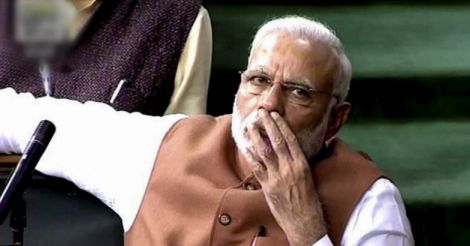Though prime minister Narendra Modi won the Gangetic plains in the assembly elections by sweeping Uttar Pradesh and Uttarakhand, the Himalayan region has been a source of concern for the national security team.
Kashmir Valley is on the boil over the incidents of violence and killings, involving protesters and armed forces. In the higher plateaus and Himalayan mountains, the Chinese dragon is belching smoke against India. Modi and his core team are grappling with the rising tension between India and China.
The first year of Modi's prime ministership saw smoother relations where Modi gave red carpet treatment to Chinese president Xi Jinping and got the assurance of Chinese investment of 75 billion dollars. But the chill began to develop in the summer of 2015 after China refused to support the move to declare Pakistan-based Hafiz Muhammad Saeed, chief of Jamaat-ud-Dawa, as an international terror sponsor.
The differences have escalated over the two ancient fault lines – China’s long-term support to Pakistan, and India's steadfast support to the Tibetan spiritual leader Dalai Lama. The third fault line, which has soured the relations is China’s refusal to support India's entry into the Nuclear Suppliers Group (NSG), where there must be complete consensus to admit a new member.
Despite Modi rushing several emissaries to Beijing to persuade the Chinese leaders, China has remained adamant that it will not accept a special exemption for India, which has refused to sign the Non-Proliferation Treaty (NPT) – a must for the admission.
India has argued that it has exemplary record in not exporting nuclear technology, and is backed by major nuclear powers like the United States, Russia, France and England. But China has argued that India cannot be exceptional and rules should be made to allow entry of other countries, which have not signed the NPT.
But on the ground, the refusal of China has not made much of a difference because India is importing uranium for its nuclear reactors from Russia and France, with Australia now promising to relax its export control regime without India joining the NSG.
New Delhi not only supported the Dalai Lama's visit to Arunachal Pradesh, which China claims as its territory, but minister of state for home Kiran Rijiju was there to receive the Tibetan Nobel peace laureate. After attacking India over encouraging the "splittist" leader, accused of trying to get independence for Tibet, China announced new names for six places in Arunachal Pradesh.
Now, China has accused India of arm twisting Nepal to reduce the scale of a Nepal-China military exercise. China has also gone aggressive on its plans to build a new silk route from China to central Asia through the Indian territory, now under the occupation of Pakistan. But Modi has refused to endorse a summit of more than 90 countries convened by Jinping to celebrate the new silk route, showing that India would not be the first to blink.
Realizing that India needs to have the bigger powers in the loop over the belligerence of China, Modi asked finance and defence minister Arun Jaitley to brief the Donald Trump administration in Washington during a visit to attend the World Bank meeting. Interestingly, Jaitley has also been asked to travel to Russia from Washington in his capacity as defence minister to brief Russian leaders. There is expectation that Jaitley's visit, where more Russian defence equipment will be ordered, would persuade Russian president Vladimir Putin to ask China to be less belligerent towards India.
Modi himself will be meeting Putin and Jinping at an economic summit in Moscow in a few weeks, even as the Indian diplomats are in touch with the French government, in the grip of presidential election, and the British government, where the prime minister has ordered a snap parliament election for June. President Donald Trump, who has already met leaders of China, Japan and England, has not yet confirmed the dates for a summit meeting with Modi, which is expected in the summer.

























 Prime Minister Narendra Modi in the Lok Sabha in New Delhi. File photo
Prime Minister Narendra Modi in the Lok Sabha in New Delhi. File photo